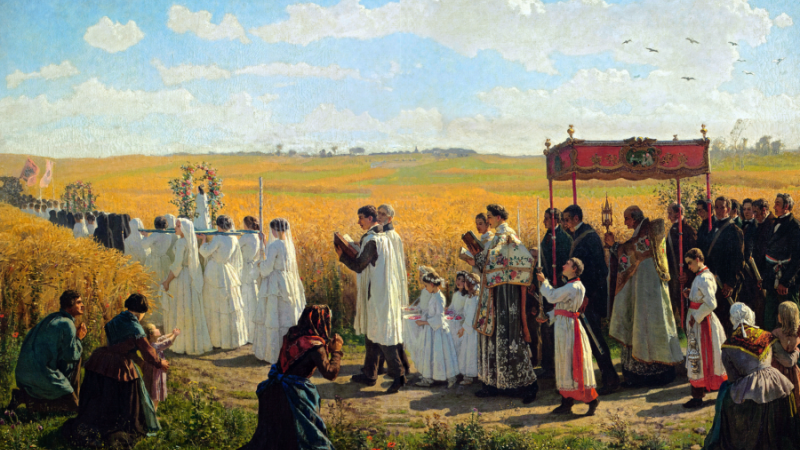Ember Days in Lent 2019 : Opportunity for Additional Sacrifice and Spiritual Growth

History of the Ember Days
The Ember Days, which were historically kept four times during the liturgical year, have a venerable history. Here is the explanation from the 1917 Catholic Encyclopedia.
The purpose of their introduction, besides the general one intended by all prayer and fasting, was to thank God for the gifts of nature, to teach men to make use of them in moderation, and to assist the needy.
The Romans were originally given to agriculture, and their native gods belonged to the same class. At the beginning of the time for seeding and harvesting religious ceremonies were performed to implore the help of their deities: in June for a bountiful harvest, in September for a rich vintage, and in December for the seeding; hence their feriae sementivae, feriae messis, and feri vindimiales.
The Church, when converting heathen nations, has always tried to sanctify any practices which could be utilized for a good purpose. At first the Church in Rome had fasts in June, September, and December; the exact days were not fixed but were announced by the priests. The "Liber Pontificalis" ascribes to Pope Callistus (217-222) a law ordering the fast, but probably it is older. Leo the Great (440-461) considers it an Apostolic institution.
This pope also permitted the conferring of priesthood and deaconship on the Saturdays of ember week--these were formerly given only at Easter. Before Gelasius the ember days were known only in Rome, but after his time their observance spread. They were brought into England by St. Augustine; into Gaul and Germany by the Carlovingians. Spain adopted them with the Roman Liturgy in the eleventh century. They were introduced by St. Charles Borromeo into Milan.
The Eastern Church does not know them. The present Roman Missal, in the formulary for the Ember days, retains in part the old practice of lessons from Scripture in addition to the ordinary two: for the Wednesdays three, for the Saturdays six, and seven for the Saturday in December. Some of these lessons contain promises of a bountiful harvest for those that serve God.

Keeping with Tradition
Catholics who have access to the traditional liturgy outside of Sundays should make a special point to assist at Mass on Wednesday, Friday, and Saturday of this week. In addition to keeping the fasting and abstinence prescriptions on these days, the faithful should be attentive to the special collects and readings that are assigned on these days. Here, for instance, are the Collects from Wednesday, which properly capture the spirit of these days.
Why do we fast and abstain?
“Unless you do penance, you shall likewise perish.” (Lk. 13:5)
Because we are sinners, justice requires each of us to make recompense to God for the honor we have denied Him by our sins. Because we have misused our goods, our souls and bodies—as well as those of others—the natural law requires us to strive to restore the order we have disturbed by our sins. Thus, the Natural Law and the Divine Law bind us in a general way to perform acts of penance. In order to help us fulfill this requirement, Holy Mother Church, knowing our weakness and laziness, binds us under ecclesiastical laws to perform works of penance at certain times.
Throughout the centuries, these ecclesiastical laws have changed, sometimes becoming more strict, sometimes relaxing the discipline of penance. Regardless of changes to the Church laws, which exist to make our obedience to the natural and Divine laws of penance easier, the fundamental requirement remains: “Unless you do penance, you shall likewise perish.”
Considering the alternatives of unending bliss in heaven or unending misery in hell, and considering that the effects of original sin and of our own sins make us lazy and apt to forget our duty towards God, it seems much more reasonable to err on the side of too much penance, especially in times of relaxed Church discipline such as our own, rather than on the side of too little.
Only the Church can hold us guilty of mortal sin for failing in this or that specific act of penance, but we can certainly offend God mortally by neglecting penance completely over a length of time. This principle should be kept in mind when deciding on concrete penitential practices in accordance with the requirements and guidelines listed below. “Rules for penitential days under present Church law” details the bare minimum of penance which we must accomplish if we are to hope to stay out of mortal sin.
Nevertheless, we will easily fall into mortal sin if we confine our entire penance for the year to those days and acts required by the current law. “Guidelines for traditional penitential practices” spells out the strongly recommended practices which were observed until just after the Second Vatican Council.
Leave a comment
Comments will be approved before showing up.
Also in Angelus Press Blog

Angelus Press Website Update is Complete

Angelus Press Website Updates for Wholesale Accounts

Fr. Dominique Bourmaud Passes Away
With great sadness, the U.S. District of the Society of Saint Pius X (SSPX) announces the passing of Fr. Dominique Bourmaud. He went to his eternal reward in the early hours of Saturday, September 4, 2021.
Eternal rest grant unto Fr. Dominique Bourmaud, O Lord, and let perpetual light shine upon him. May he rest in peace. Amen.

Angelus Press
Author